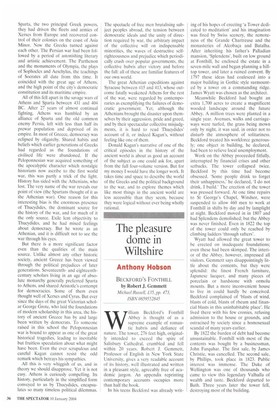When Greek met Greek
Jonathan Sumption
THE PELOPONNESIAN WAR: ATHENS AND SPARTA IN SAVAGE CONFLICT 431-404 BC by Donald Kagan HatperCollins, £25, pp. 511, ISBN 0007115059 This book is an abridged version of one of the great works of modern classical scholarship, Donald Kagan's four-volume history of the Peloponnesian war, which originally appeared between 1969 and 1987. This crisis in the affairs of the Greek world in the fifth century BC was seen, even at the time, as a turning point in human civilisation.
Nearly half a century before, the Greeks had united against the great continental power of Persia. Led by Athens and Sparta, the two principal Greek powers, they had driven the fleets and armies of Xerxes from Europe and recovered control of their colonies on the coast of Asia Minor. Now the Greeks turned against each other. The Persian war had been followed by a period of astonishing literary and artistic achievement. The Parthenon and the monuments of Olympia, the plays of Sophocles and Aeschylus, the teachings of Socrates all date from this time. It coincided with the great age of Athens, and the high point of the city's democratic constitution and its maritime empire.
All of this fell apart in the savage wars of Athens and Sparta between 431 and 404 BC. After 27 years of almost continual fighting, Athens was humbled by an alliance of Sparta and the old common enemy Persia, left with less than half its prewar population and deprived of its empire. In most of Greece, democracy was eclipsed by oligarchy. Shared habits and beliefs which earlier generations of Greeks had regarded as the foundations of civilised life were abandoned. If the Peloponnesian war acquired something of the apocalyptic character which nostalgic historians now ascribe to the first world war, this was partly a trick of the light. History has sided with the Athenians, who lost. The very name of the war reveals our point of view (the Spartans thought of it as the Athenian war). One reason for this interesting bias is the enormous presence of Thucydides, the dominant source for the history of the war, and for much of it the only source. Exile lent objectivity to Thucydides, and he had mixed feelings about democracy. But he wrote as an Athenian, and it is difficult not to see the war through his eyes.
But there is a more significant factor even than the qualities of the main source. Unlike almost any other historic society, ancient Greece has been viewed through the political prejudices of later generations. Seventeenthand eighteenthcentury scholars living in an age of absolute monarchy generally preferred Sparta to Athens, and shared Aristotle's contempt for democracies. Some of them even thought well of Xerxes and Cyrus. But ever since the days of the great Victorian scholar George Grote, who laid the foundations of modern scholarship in this area, the history of ancient Greece has by and large been written by democrats. To someone raised in this school the Peloponnesian war is bound to appear as one of the great historical tragedies, leading to inevitable but fruitless speculation about what might have been. Even the ever scrupulous and careful Kagan cannot resist the odd remark which betrays his sympathies.
All this is very whiggish of us, and in theory we should disapprove. Yet it is not easy. Athens is curiously compelling. Its history, particularly in the simplified form conveyed to us by Thucydides, encapsulates so many timeless political dilemmas. The spectacle of free men brutalising subject peoples abroad, the tension between democratic ideals and the unity of direction required by war, the arbitrary impact of the collective will on indispensable minorities, the waves of destructive selfrighteousness and prejudice which periodically crash over popular governments, the collective hubris after victory and before the fall: all of these are familiar features of our own world.
The great Athenian expeditions against Syracuse between 415 and 413, whose outcome fatally weakened Athens for the rest of the war, were regarded by contemporaries as exemplifying the failures of democratic government. Yet, although the Athenians brought the disaster upon themselves by their aggression, pride and greed, and by their spectacular collective misjudgments, it is hard to read Thucydides' account of it, or indeed Kagan's, without feeling like one of them.
Donald Kagan's narrative of one of the critical episodes in the history of the ancient world is about as good an account of the subject as one could ask for, apart from the full four-volume version. But for my money I would have the longer work. It takes time and space to describe the world of the Greeks and the political background to the war, and to explore themes which like most things in the ancient world are less accessible than they seem, because they were logical without ever being wholly rational.



























































 Previous page
Previous page